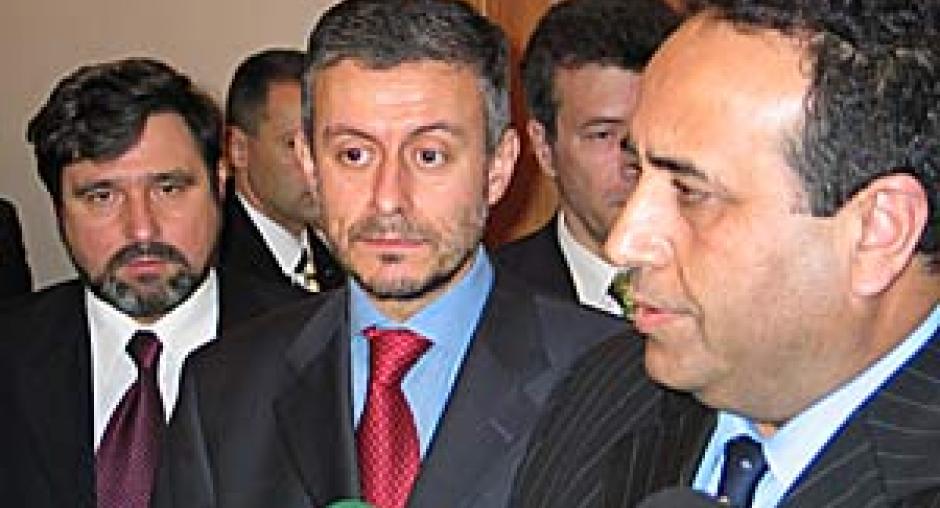Newsroom
OSCE Chairman calls on Azerbaijan and Armenia to continue talks on Nagorno-Karabakh
BAKU 16 March 2004

(OSCE/Mikhail Evstafiev)OSCE Chairman-in-Office Solomon Passy (centre) and Azerbaijan's Foreign Minister Vilayat Guliyev (right) talk to journalists in Baku, 16 March 2004. (OSCE/Mikhail Evstafiev) Photo details
BAKU, 16 March 2004 - The OSCE Chairman-in-Office, Bulgarian Foreign Minister Solomon Passy, has called upon the sides involved in the Nagorno-Karabakh conflict to continue dialogue without any preconditions.
Speaking in Baku, on Tuesday, the Chairman-in-Office said: "The key to the solution is in direct dialogue."
"The OSCE is always prepared to be a facilitator. We can offer many scenarios on the resolution of the conflict but it will all be just laboratory work until both Azerbaijan and Armenia reach an agreement at the table. The only scenario that will work is the one which is negotiated directly, with mutual compromises."
Nagorno-Karabakh was one of the main topics in discussions which the OSCE Chairman-in-Office held with the President of Azerbaijan, Ilham Aliyev. During his visit to Baku, the Chairman-in-Office also met Prime Minister Artur Rasi-Zade, the Speaker of Parliament, Murtuz Aleskerov, and Foreign Minister Vilayat Guliyev, as well as opposition leaders and representatives of non-governmental organizations.
Minister Passy said the OSCE Minsk Group was working very hard to help achieve a solution to the conflict. "But the OSCE is not capable of miracles and can't impose a ready solution. History teaches us that with conflicts time always works against us. The later a solution is found, the more painful it may be for the people of the region."
The Chairman-in-Office expressed hope that education, a priority of the Bulgarian OSCE Chairmanship, would eventually play a role in resolving the Nagorno-Karabakh conflict. In particular, he noted the importance of having accurate and objective history books.
"We must invest in the education of the next generation," the Minister said. "If we allow our children to be misled by propaganda, the next generation will find it hard to be objective and walk away from old scars."
Another topic in the discussions was the follow-up to the recommendations to the report of the OSCE's Office for Democratic Institutions and Human Rights on the conduct of the Presidential Election of 15 October last year.
"I believe we may now move on, utilizing the lessons learned and thereby opening the way to free and fair municipal elections, scheduled for later this year," the Chairman-in-Office said. "I trust they may provide a substantial platform for building public confidence across the political spectrum."
Minister Passy also brought up the question of disturbances after the October election and the arrest of a number of people who are now awaiting trial. He said he had a positive reaction on this issue from President Aliyev.
"I am pleased to note that court proceedings are now underway. It is my fervent hope that the process will be transparent and the judgements fair and appropriate," he said.
Speaking in Baku, on Tuesday, the Chairman-in-Office said: "The key to the solution is in direct dialogue."
"The OSCE is always prepared to be a facilitator. We can offer many scenarios on the resolution of the conflict but it will all be just laboratory work until both Azerbaijan and Armenia reach an agreement at the table. The only scenario that will work is the one which is negotiated directly, with mutual compromises."
Nagorno-Karabakh was one of the main topics in discussions which the OSCE Chairman-in-Office held with the President of Azerbaijan, Ilham Aliyev. During his visit to Baku, the Chairman-in-Office also met Prime Minister Artur Rasi-Zade, the Speaker of Parliament, Murtuz Aleskerov, and Foreign Minister Vilayat Guliyev, as well as opposition leaders and representatives of non-governmental organizations.
Minister Passy said the OSCE Minsk Group was working very hard to help achieve a solution to the conflict. "But the OSCE is not capable of miracles and can't impose a ready solution. History teaches us that with conflicts time always works against us. The later a solution is found, the more painful it may be for the people of the region."
The Chairman-in-Office expressed hope that education, a priority of the Bulgarian OSCE Chairmanship, would eventually play a role in resolving the Nagorno-Karabakh conflict. In particular, he noted the importance of having accurate and objective history books.
"We must invest in the education of the next generation," the Minister said. "If we allow our children to be misled by propaganda, the next generation will find it hard to be objective and walk away from old scars."
Another topic in the discussions was the follow-up to the recommendations to the report of the OSCE's Office for Democratic Institutions and Human Rights on the conduct of the Presidential Election of 15 October last year.
"I believe we may now move on, utilizing the lessons learned and thereby opening the way to free and fair municipal elections, scheduled for later this year," the Chairman-in-Office said. "I trust they may provide a substantial platform for building public confidence across the political spectrum."
Minister Passy also brought up the question of disturbances after the October election and the arrest of a number of people who are now awaiting trial. He said he had a positive reaction on this issue from President Aliyev.
"I am pleased to note that court proceedings are now underway. It is my fervent hope that the process will be transparent and the judgements fair and appropriate," he said.
